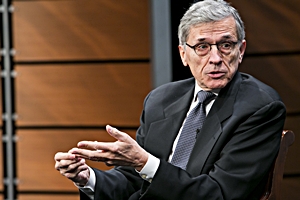Unwanted FCC net neutrality vote sparks calls for gov’t regulated Internet

By Josh Peterson | Watchdog.org
WASHINGTON, D.C. — Desperate to regulate the Internet, Federal Communications Commission Chairman Tom Wheeler won few friends Thursday after the agency voted to move forward with a proposal that has worried onlookers and drawn widespread condemnation and protests.
POINTS: Federal Communications Commission Chairman Tom Wheeler may have made new friends on Thursday.
The vote Thursday sets July 15 as the last day the FCC will accept public comments on its latest attempt to govern how private Internet service providers (ISPs) manage the flow of Internet traffic across their networks.
The 3-2 vote split along partisan lines: The commission’s three Democrats supported the proposal, opposed by its two Republicans.
Both sides of the debate called for the protection of the open Internet, but each side, however, is unhappy with the latest proposal, differing in who they think should be reined in — the government or the free market.
The new proposal, which is the agency’s third attempt in the past decade at net neutrality regulations, allows Internet companies to continue negotiating traffic management deals, but also gives the public the chance to weigh in on whether the agency should heavily regulate ISPs under the same rules as phone companies.
Liberal critics of the proposal, allied with major Web content companies, claim heavy regulation would protect freedom of expression on the Internet and give small business the chance to compete with big businesses.
Conservative and libertarian critics, siding with the nation’s ISPs and Republican lawmakers, warn the FCC’s rules are a power grab over the Internet by unelected bureaucrats.
The Internet functions in part through paid deals between ISPs and content companies, allowing information to travel across the various networks.
Exploding consumer demand for high-quality video content is driving ISPs to seek more money, but, to meet the costs of that demand, also fueling the net neutrality war.
Content services, such as Netflix, enjoying the rewards of that consumer demand, have accused the ISPs of extortion and support government regulation of ISPs to protect its own profit margins.
ISPs threatened Wheeler in the lead up to the vote with years of legal action against the agency should the FCC try to govern them as heavily regulated phone companies.
Republican FCC Commissioner Ajit Pai, who opposed Wheeler’s proposal along with Republican colleague FCC Commissioner Michael O’Reilly, agreed with Rosenworcel and proposed the agency commission a study on net neutrality before attempting to institute a new regulatory regime.
Only FCC Commissioner Mignon Clyburn, a Democrat, came out in full support of Wheeler’s proposal.
Democratic FCC Commissioner Jessica Rosenworcel, who previously called for a delayed vote to give the public more time to comment, merely concurred with her Democratic colleagues Thursday.
Members of Congress also were not unanimous in their condemnation of the vote. Democrats sided with liberal activists and the content companies; Republicans with conservative and libertarian activists and the ISPs.
California Democratic U.S. Rep. Anna Eshoo, a major beneficiary of Silicon Valley campaign cash, was not shy in her support for Wheeler’s consideration to potentially reclassify the way ISPs are regulated by the agency.
“If the Internet is to continue to thrive,” she said in a statement, “the proposed rules must be strong enough to prevent online gatekeepers from creating fast and slow lanes, and stand on strong legal ground to avoid yet another round of legal challenges.”
Contact Josh Peterson at jpeterson@watchdog.org. Follow Josh on Twitter at @jdpeterson







